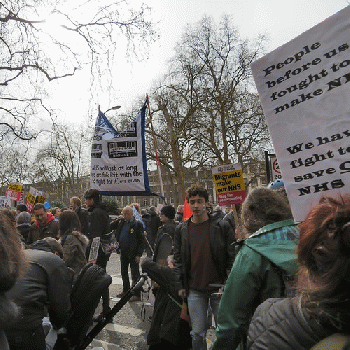Republished from johnpilger.com
A rational person would question why Britain has fared so badly in the COVID-19 pandemic. It is a rich country with the sixth largest economy in the world, a proud history of public health and a National Health Service (NHS) arising from the ashes of World War II. This forms the central pillar of the welfare state, providing universal, comprehensive care to all citizens irrespective of ability to pay.
Despite these advantages, there has been an estimated excess death toll of more than 50,000 people, second only to the United States, with the highest deaths per million, in the world.
To understand this catastrophe it is essential to appreciate the neoliberal reforms which have steadily mutated this institution over decades. Having experienced first-hand and studied the treacherous process, as a general practitioner and NHS doctor for close to 27 years, we are shocked, yet not surprised.
Two years after the 2008 Global Financial Crisis, the Conservative-Liberal Democrats coalition government embarked on their austerity program. This was an economically illiterate plan, drawing the false comparison between macroeconomics and household finances, an approach popularised by former Prime Minister Margaret Thatcher.
A hoodwinked public accepted their narrative and with it wage stagnation and cuts to public services: a monumental lie transferred the debt burden of bank bailouts onto the shoulders of the weakest. For the NHS, this meant a decade of de-funding and a reduction in the historical average annual increase in spending on health (4%-1%). Simultaneously the NHS was further restructured, a process that started in 1970s but accelerated under the fog of austerity.
A former NHS director-general for commissioning Mark Britnell explained it in 2010 like this: "In [the] future, the NHS will be a state insurance provider not a state deliverer.
"In [the] future 'any willing provider' from the private sector will be able to sell goods and services to the system. The NHS will be shown no mercy and the best time to take advantage of this will be in the next couple of years."
The Health and Social Care Act 2012 ensured that advantage was taken, creating a fully marketised NHS. The Secretary of State's legal "duty to provide" was removed and replaced with a "duty to promote" health services, abolishing the very premise of the NHS. New funding structures replicating United States private health insurance pools known as Clinical Commissioning Groups were set up to force the outsourcing of medical services.
QUANGOS (quasi non-governmental organisations) were created -- NHS England and Public Health England -- headed up by government appointees. Well established decentralised public health infrastructure was dismantled and institutional memory and expertise cast aside as part of 10,000 redundancies and a  �700 million funding cut over five years.
The 2016 referendum on Brexit generated a groundswell of anti-establishment feeling. The pain of austerity was soothed with the balm of nationalism and a rejection of European bureaucracy. This returned a Leave vote, which plunged Britain into a political quagmire and bitter division.
A country in the midst of a productivity crisis, due to consecutive governments dismantling industry, casualising employment and financialising the economy, was also removing vital safety nets. Rising inequality, the vogue for zero hours contracts, and escalating living costs created precariousness with 10 million households without any savings.
By 2019, the NHS was on its knees: a decade of funding squeezes resulted in 17,000 bed cuts; 10,000 doctor vacancies; and 40,000 nursing vacancies. Britain now had the fewest number of doctors and hospital beds per capita in Western Europe.
This weakened health service and weakened population have been left to fend off this pandemic, with a misanthropic "Brexit before breathing" government at the helm.
With the groundwork completed, the profitable remnants of the NHS could now be turned over to business. The poor were no longer secure; their plight foretold by 1980s satirist Rick Mayall. "You see, in the good old days, you were poor, you got ill, and you died. And yet, and yet these days people seem to think they have some God given right to be cured!"
(Note: You can view every article as one long page if you sign up as an Advocate Member, or higher).






